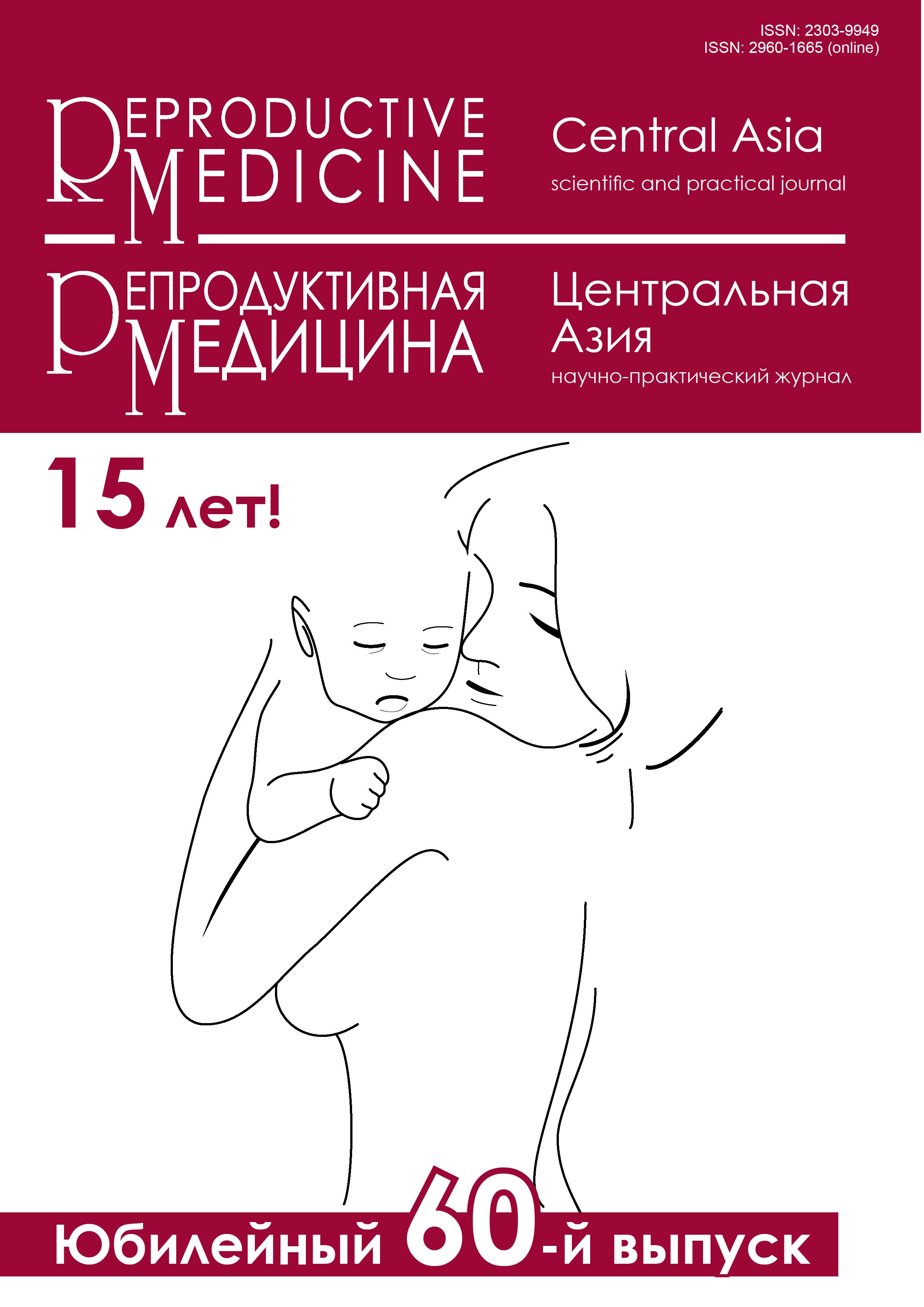The impact of endometrial microbiota on in vitro fertilization outcomes: A literature review
DOI:
https://doi.org/10.37800/RM.3.2024.16-22Keywords:
microbiota, endometrium, infertility, in vitri fertilization (IVF), assisted reproductive technologies (ART)Abstract
Relevance: Despite significant advancements in assisted reproductive technologies (ART), the failure rate of infertility treatments remains relatively high, highlighting the need for further investigation into factors affecting the success of in vitro fertilization (IVF) procedures. Current research in reproductive medicine increasingly recognizes the endometrial microbiota's critical role in infertility treatment success.
The study aimed to summarize the data on the relationship between endometrial microbiota and infertility treatment outcomes using IVF.
Materials and Methods: We conducted a literature review by analyzing published research studies in English and Russian, focusing on the impact of endometrial microbiota on IVF outcomes. The literature search was carried out in databases such as PubMed, Scopus, Web of Science, and Google Scholar, covering the period from 2014 to 2024.
Results: Existing data indicate complex relationships between specific microbiota profiles and reproductive health, with particular emphasis on Lactobacillus species, considered potential markers of a healthy endometrial environment. However, the lack of standardized microbiota characterization and variability in sampling methods underscore the challenges in establishing definitive associations. Furthermore, the analysis shows that current studies often suffer from tiny sample sizes, limiting the generalizability of the findings.
Conclusion: This review highlights the need for larger-scale prospective studies with stringent methodological standards to understand better the role of endometrial microbiota in predicting IVF outcomes. A deeper understanding of the role of microbiota in implantation promises to revolutionize preventive, diagnostic, and therapeutic strategies in reproductive medicine, paving the way for personalized treatment approaches.
References
Fishel S. First in vitro fertilization baby—this is how it happened. Fertil Steril. 2018;110:5-11.
https://doi.org/10.1016/j.fertnstert.2018.03.008
Shingshetty L, Cameron NJ, Mclernon DJ, Bhattacharya S. Predictors of success after in vitro fertilization. Fertil Steril. 2024;5(121):742-751.
https://doi.org/10.1016/j.fertnstert.2024.03.003
Ribeiro S, Sousa M. In vitro fertilisation and intracytoplasmic sperm injection predictive factors: A review of the effect of female age, ovarian reserve, male age, and male factor on IVF/ICSI treatment outcomes. JBRA Assist Reprod. 2023;1(27):97.
https://doi.org/10.5935/1518-0557.20220000
Moreno I, Franasiak JM. Endometrial microbiota—new player in town. Fertil Steril. 2017;108:32-39.
https://doi.org/10.1016/j.fertnstert.2017.05.034
Moreno I, Garcia-Grau I, Perez-Villaroya D, Gonzalez-Monfort M, Bahçeci M, Barrionuevo MJ, Taguchi S, Puente E, Dimattina M, Lim MW, Meneghini G, Aubuchon M, Leondires M, Izquierdo A, Perez-Olgiati M, Chavez A, Seethram K, Bau D, Gomez C, Valbuena D, Simon C. Endometrial microbiota composition is associated with reproductive outcome in infertile patients. Microbiome. 2022;10:1.
https://doi.org/10.1186/s40168-021-01184-w
Bodurska T, Konova E, Pachkova S, Yordanov A. Endometrial microbiome and women’s reproductive health – review of the problem endometrial microbiome and reproductive health. J Pure Appl Microbiol. 2021;4(15):1727-1734.
https://doi.org/10.22207/jpam.15.4.03
Medina-Bastidas D, Camacho-Arroyo I, García-Gómez E. Current findings in endometrial microbiome: impact on uterine diseases. Reproduction. 2022;5(163).
https://doi.org/10.1530/REP-21-0120
Foteinidou P, Exindari M, Chatzidimitriou D, Gioula G. Endometrial microbiome and its correlation to female infertility: A systematic review and meta-analysis. Acta Microbiol Hell. 2024;69:14-28.
https://doi.org/10.3390/amh69010004
Бахарева И.В. Роль вагинальной микробиоты в сохранении женского репродуктивного здоровья: обзор литературы (часть 1). Репрод мед. 2022;1(50):52-59.
Bakhareva IV. The role of the vaginal microbiota in the preservation of female reproductive health: literature review (part 1). Reprod Med. 2022;1(50):52-59. (In Russ.).
https://doi.org/10.37800/RM.1.2022.52-59
Lozano FM, Bernabeu A, Lledo B, Morales R, Diaz M, Aranda FI, Llacer J, Bernabeu R. Characterization of the vaginal and endometrial microbiome in patients with chronic endometritis. Eur J Obstet Gynecol Reprod Biol. 2021;263:25-32.
https://doi.org/10.1016/j.ejogrb.2021.05.045
Mitchell CM, Haick A, Nkwopara E, Garcia R, Rendi M, Agnew K, Fredricks DN, Eschenbach D. Colonization of the upper genital tract by vaginal bacterial species in nonpregnant women. Am J Obstet Gynecol. 2015;212:611.e1-611.e9.
https://doi.org/10.1016/j.ajog.2014.11.043
Miller JR, Andre R. Quantitative polymerase chain reaction. Br J Hosp Med. 2014;75.
https://doi.org/10.12968/hmed.2014.75.sup12.c188
Sanschagrin S, Yergeau E. Next-generation sequencing of 16S ribosomal RNA gene amplicons. JoVE. 2014.
Dube R, Kar SS. Genital microbiota and outcome of assisted reproductive treatment – A systematic review. Life. 2022;12:1867.
https://doi.org/10.3390/life12111867
Park ST, Kim J. Trends in next-generation sequencing and a new era for whole genome sequencing. Int Neurourol J. 2016;20.
https://doi.org/10.5213/inj.1632742.371
Liang J, Li M, Zhang L, Yang Y, Jin X, Zhang Q, Lv T, Huang Z, Liao Q, Tong X. Analysis of the microbiota composition in the genital tract of infertile patients with chronic endometritis or endometrial polyps. Front Cell Infect Microbiol. 2023;13.
https://doi.org/10.3389/fcimb.2023.1125640
Wee BA, Thomas M, Sweeney EL, Frentiu FD, Samios M, Ravel J, Gajer P, Myers G, Timms P, Allan JA, Huston WM. A retrospective pilot study to determine whether the reproductive tract microbiota differs between women with a history of infertility and fertile women. Aust N Z J Obstet Gynaecol. 2018;58:341-348.
https://doi.org/10.1111/ajo.12754
Miyagi M, Mekaru K, Tanaka SE, Arai W, Ashikawa K, Sakuraba Y, Nakamura R, Oishi S, Akamine K, Aoki Y. Endometrial and vaginal microbiomes influence assisted reproductive technology outcomes. JBRA Assist Reprod. 2023;27:267-281.
https://doi.org/10.5935/1518-0557.20220040
Vitale SG, Ferrari F, Ciebiera M, Zgliczyńska M, Rapisarda AMC, Vecchio GM, Pino A, Angelico G, Knafel A, Riemma G, De Franciscis P, Cianci S. The role of genital tract microbiome in fertility: A systematic review. Int J Mol Sci. 2022;23:180.
https://doi.org/10.3390/ijms23010180
Benner M, Ferwerda G, Joosten I, van der Molen RG. How uterine microbiota might be responsible for a receptive, fertile endometrium. Hum Reprod Upd. 2018;24:393-415.
https://doi.org/10.1093/humupd/dmy012
Odendaal J, Black N, Bennett PR, Brosens J, Quenby S, MacIntyre DA. The endometrial microbiota and early pregnancy loss. Hum Reprod. 2024;dead274.
https://doi.org/10.1093/humrep/dead274
Hashimoto T, Kyono K. Does dysbiotic endometrium affect blastocyst implantation in IVF patients? J Assist Reprod Genet. 2019;12(36):2471-2479.
https://doi.org/10.1007/s10815-019-01630-7
Bui BN, Van Hoogenhuijze N, Viveen M, Mol F, Teklenburg G, de Bruin JP, Besselink D, Brentjens LS, Mackens S, Rogers MR, Steba GS. The endometrial microbiota of women with or without a live birth within 12 months after a first failed IVF/ICSI cycle. Sci Rep. 2023;1(13):3444.
https://doi.org/10.1038/s41598-023-30591-2
Diaz-Martínez MD, Bernabeu A, Lledó B, Carratalá-Munuera C, Quesada JA, Lozano FM, Ruiz V, Morales R, Llácer J, Ten J, Castillo JC. Impact of the vaginal and endometrial microbiome pattern on assisted reproduction outcomes. J Clin Med. 2021;10(18):4063.
https://doi.org/10.3390/jcm10184063
Cela V, Daniele S, Obino ME, Ruggiero M, Zappelli E, Ceccarelli L, Papini F, Marzi I, Scarfò G, Tosi F, Franzoni F. Endometrial dysbiosis is related to inflammatory factors in women with repeated implantation failure: a pilot study. J Clin Med. 2022;9(11):2481.
https://doi.org/10.3390/jcm11092481
Chen W, Wei K, He X, Wei J, Yang L, Li L, Chen T, Tan B. Identification of uterine microbiota in infertile women receiving in vitro fertilization with and without chronic endometritis. Front Cell Dev Biol. 2021;9:693267.
https://doi.org/10.3389/fcell.2021
Vajpeyee M, Tiwari S, Yadav LB, Tank P. Assessment of bacterial diversity associated with assisted reproductive technologies through next-generation sequencing. Middle East Fertil Soc J. 2022;1(27):28.
https://doi.org/10.1186/s43043-022-00117-3
Kaluanga Bwanga P, Tremblay-Lemoine PL, Timmermans M, Ravet S, Munaut C, Nisolle M, Henry L. The endometrial microbiota: challenges and prospects. Medicina (Mex). 2023;59:1540.
Downloads
Published
How to Cite
Issue
Section
License
Copyright (c) 2024 The rights to a manuscript accepted for publication are transferred to the Journal Publisher. When reprinting all or part of the material, the author must refer to the primary publication in this journal.

This work is licensed under a Creative Commons Attribution-NonCommercial-NoDerivatives 4.0 International License.
The articles published in this Journal are licensed under the CC BY-NC-ND 4.0 (Creative Commons Attribution – Non-Commercial – No Derivatives 4.0 International) license, which provides for their non-commercial use only. Under this license, users have the right to copy and distribute the material in copyright but are not permitted to modify or use it for commercial purposes. Full details on the licensing are available at https://creativecommons.org/licenses/by-nc-nd/4.0/.





